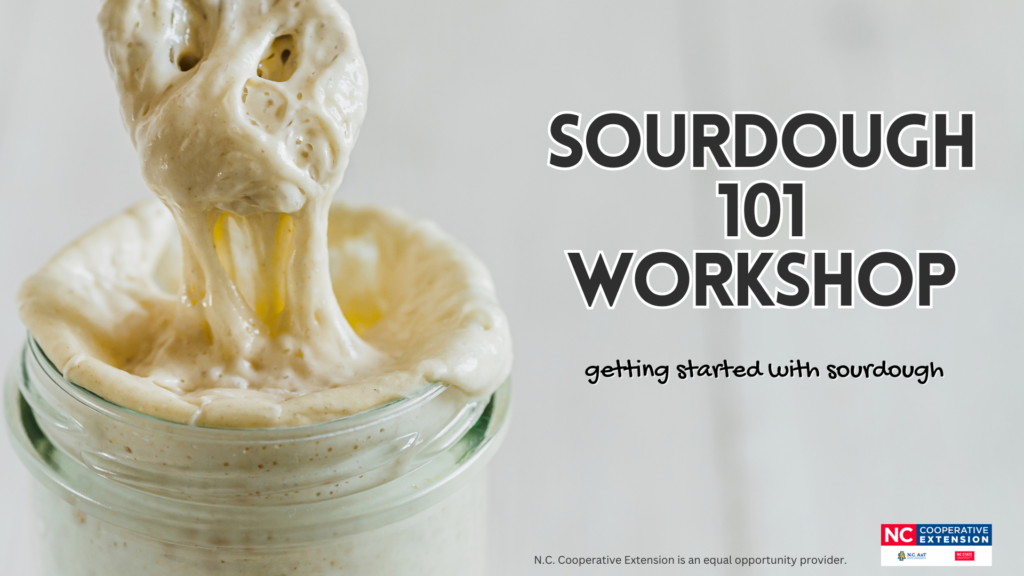Ready to Make a Sourdough Starter?
go.ncsu.edu/readext?1023929
en Español / em Português
El inglés es el idioma de control de esta página. En la medida en que haya algún conflicto entre la traducción al inglés y la traducción, el inglés prevalece.
Al hacer clic en el enlace de traducción se activa un servicio de traducción gratuito para convertir la página al español. Al igual que con cualquier traducción por Internet, la conversión no es sensible al contexto y puede que no traduzca el texto en su significado original. NC State Extension no garantiza la exactitud del texto traducido. Por favor, tenga en cuenta que algunas aplicaciones y/o servicios pueden no funcionar como se espera cuando se traducen.
Português
Inglês é o idioma de controle desta página. Na medida que haja algum conflito entre o texto original em Inglês e a tradução, o Inglês prevalece.
Ao clicar no link de tradução, um serviço gratuito de tradução será ativado para converter a página para o Português. Como em qualquer tradução pela internet, a conversão não é sensivel ao contexto e pode não ocorrer a tradução para o significado orginal. O serviço de Extensão da Carolina do Norte (NC State Extension) não garante a exatidão do texto traduzido. Por favor, observe que algumas funções ou serviços podem não funcionar como esperado após a tradução.
English
English is the controlling language of this page. To the extent there is any conflict between the English text and the translation, English controls.
Clicking on the translation link activates a free translation service to convert the page to Spanish. As with any Internet translation, the conversion is not context-sensitive and may not translate the text to its original meaning. NC State Extension does not guarantee the accuracy of the translated text. Please note that some applications and/or services may not function as expected when translated.
Collapse ▲Sourdough 101 Workshop
Are you ready to make a sourdough starter? If so, there are a few things you want to keep in mind.
- Food safety is key! Make sure that you are handwashing and keeping your work space and tools clean.
- Use unchlorinated water. If your tap water is chlorinated, fill a glass with the amount you need and let it sit for at least 24 hours before using.
- Wash hands and utensils after handling raw flour. Raw (uncooked) flour could contain microorganisms such as E.Coli or Salmonella that could lead to food-borne illness.
- Your starter will need to be fed regularly. You need to properly care for a sourdough starter by discarding and feeding on a routine schedule in order for the microorganisms to grow and thrive.
Want to learn more? Register for the Sourdough 101 Workshop this September.
In this beginners class, we will discuss how sourdough works, wet and dry measuring skills, and how to make and care for a sourdough starter. Participants will get hands-on practice making a starter to take with them.
Class size is limited, so see the Eventbrite link here for more details and to register.
Registration ends September 9th, 2024 at 12 Noon.
WHEN: SATURDAY, SEPTEMBER 14TH AT 9:30 a.m.
WHERE: In the demo kitchen at the Extension office located at
1003 S. FAYETTEVILLE ST, ASHEBORO, NC 27203
COST: $10 per person
REGISTER: On EVENTBRITE

N.C. Cooperative Extension is an equal opportunity provider.
In compliance with the Americans with Disabilities Act, N.C. State University will honor requests for reasonable accommodations made by individuals with disabilities. Please direct accommodation requests to: Jennifer Holmes at j_holmes@ncsu.edu or at 336-318-6007. Requests can be served more effectively if notice is provided at least 10 days before the event.
References:
- Centers for Disease Control and Prevention. (n.d.). Raw flour and dough. Centers for Disease Control and Prevention. https://www.cdc.gov/food-safety/foods/no-raw-dough.html




